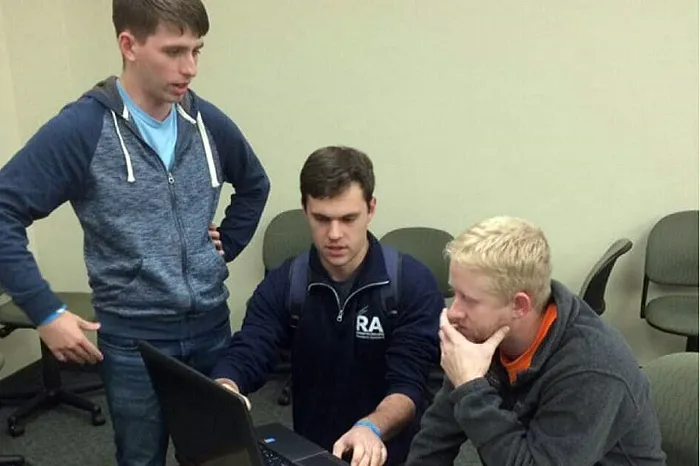
Seven Marietta College students recently competed against 18 other colleges and universities in Power The Future, a collaboration of Dominion Energy and Virginia Commonwealth University, in Richmond, Virginia.
Marietta College’s team consisted of Caleb Burnosky ’21 (Belpre, Ohio), Stephen True ’19 (Sykesville, Maryland), Ashley Klopfenstein ’20 (Cicero, Indiana), Eric Kemp ’21 (Woodsfield, Ohio), William Bates ’22 (Quaker City, Ohio), Lily Riffle ’20 (Hudson, Ohio) and Zach Conrad ’20 (New Milford, Pennsylvania). Dr. Bob Van Camp, Professor of Information Systems, accompanied the team on the trip.
“I enjoyed the trip, the competition was challenging though. We had 24 hours to create a customer-focused application for Dominion Energy,” True said. “If I were to go to this competition again, I would try different methods for more efficient organization and brainstorming. It was interesting though having a group with two Information Systems majors and one Petroleum Engineering major. We all had different knowledge about the energy industry and had different ideas on how the project should be completed.”
Power the Future is a unique 24-hour challenge where college students from all disciplines put their talents to the test to bring ideas to life.
Teams were briefed on a Dominion Energy-related scenario and were instructed to brainstorm, prototype, and then present their innovative solution to a panel of industry experts. There was a focus on developers/programmers, engineers, creatives, marketers, analysts and business development.
The 36-hour event followed the typical “hackathon” format with check-in beginning Saturday morning and final prizes awarded Sunday afternoon. “Hackathons” are often described as a mash-up of a science fair and a career fair with a little dash of a festival. In this case, college students of all academic backgrounds and skill levels came together to solve problems by using technology. Their solutions could have a positive impact on the future of Dominion Energy and they were judged by professionals from the company.
Among the competing schools were Amity University, Carnegie Mellon, Central Florida, Clemson, George Mason, Georgia Tech, Howard University, Lambda School, Maryland College, Old Dominion, Penn State, Purdue, University of Utah, University of Virginia, Virginia Commonwealth, Virginia State, Virginia Tech, West Virginia University, William & Mary,
“It was an incredibly valuable experience for these students,” Van Camp said. “Not only did they get to develop real software for a large company, but they were also able to work with students from other disciplines and were able to integrate knowledge from these disciplines to produce a quality product.”